 |
 |
 |
 |
 |
 |
 |
 |
 |
FA Cup fifth round - Ninian Park - 50,000
Scorers: Giles 2
Cardiff City: Irwin, Carver, Bell, Kellock, Murray, Phillips, Gibson, Clark, King, Woodruff, Foggon (Warboys)
Leeds United: Sprake, Madeley, Cooper, Bremner, Charlton, Hunter, Lorimer, Clarke, Jones, Giles, Gray
The Times: 'Cardiff City, lying last but one in the
Second Division, will receive Leeds United, second in the First Division,
with the respect they deserve at Ninian Park in their FA Cup fifth round
match on Saturday. The respect, however, could be mutual. Leeds remember
too well how Cardiff beat them 2-1 each time in third round ties at Elland
Road in three successive seasons between 1956 and 1958. The tendency of
history to repeat itself sparks a hope in the Welsh capital that Cup magic
will make a mockery of league positions.' It was a remarkable set of coincidences, and a manager
as superstitious as Don Revie
was bound to feel some twinges of anxiety, even though a more
recent meeting in 1964 at Ninian Park had brought United victory.
The only goal that day came from Billy Bremner, though United
finished with ten men, their centre-half, Fred Goodwin, sustaining
a broken leg. Cardiff City, winners of the Cup in 1927, and thus the only
club to take the trophy out of the country, were an average Second Division
outfit at the time, though their dominance of the Welsh Cup meant that
they were regular participants in the European Cup Winners' Cup. The highlight
for them came in March 1971 when they beat mighty Real Madrid 1-0 at Ninian
Park in the first leg of the quarter finals before going out after a 2-0
defeat in the return in the Bernabeu Stadium. City had been managed by the former Newcastle United
half-back and Scottish international Jimmy Scoular since 1964.
He took them to the verge of promotion in 1971, though their challenge
was blunted by the sale of John Toshack to Liverpool in November
1970 for £110,000. Toshack's replacement was Sheffield Wednesday
striker Alan Warboys, but he had limited success, and the Bluebirds
ended the campaign third. City had also signed Newcastle wide man Alan Foggon
for £25,000; Foggon had helped the Geordies win the Fairs Cup
in 1969 and was a former England youth cap, with pace and immense
natural talent. He also had an unfortunate reputation as one of
the scruffiest players in the game with his loosely flapping shirt,
half mast socks and wild hair. Though he was still only 21, he
was City's other big name player was Scottish midfielder
Ian Gibson, a contemporary of Billy Bremner. He was signed for
a club record £35,000 from Coventry in 1970, but most of his team
mates were journeymen. The Times: 'Local supporters believe that the goalless
draw against Norwich City, the Second Division leaders, at Ninian Park
last Saturday confirms Cardiff City's potential even if they have been
erratic this season. They have blossomed in the FA Cup. They beat Sheffield
United 3-1 in the third round at Bramall Lane. It was there that Sheffield
last April boosted their own hopes of promotion from the Second Division
and stifled Cardiff s ambition of going up by beating the Welsh club 5-1.
In the fourth round Cardiff beat Sunderland 3-1 at Maine Road in the second
replay after drawing the first two matches 1-1. 'Cardiff's manager Jimmy Scoular, a deep thinking Scot,
has understandably maintained that League points are more important to
him than Cup progress but he has been keeping a close watch on Leeds through
his northern scout Jack Foxton, who watched Leeds against Liverpool in
the fourth round replay and was asked to report again on Leeds'
match against Manchester United. Mr Scoular said that though he already
knew much about Leeds he wanted Foxton to check the strategy employed
by Leeds at set pieces, corners and free kicks. 'Cardiff's stamina is indisputable. They made light of the
heavy going against Norwich and showed no ill effects of their marathon
tie with Sunderland. 'Mr Scoular has much faith in the skill of Murray, the captain
and centre-half, Gibson, who has tormented many a defence, and the 18-year-old
midfield player Kellock, who appeared in his first home League match against
Norwich. They are all Scots. 'Murray, who has had stomach trouble and calf muscle injuries,
has begun to regain form. He believes that Cardiff have a good chance
against Leeds, "especially on our own pitch", which is a significant
remark. Gibson and the Leeds captain, Bremner,
played in the same forward line for Scotland schoolboys against England
at Wembley in 1958. 'There has been speculation in Cardiff on whether Leeds
will omit Gray because of the inevitable heavy conditions, and call on
Madeley to curb Gibson. Kellock, a strong tackler, fine distributor and
powerful finisher, was in the Cardiff side that finished runners up to
Arsenal in the FA Youth Cup last year. Mr Scoular saw him at a Scottish
schoolboys match a few years ago. He has admitted that he more or less
forgot about him, but Kellock's 'Kellock made his first appearance in the League at Charlton
on February 12. He scored Cardiff's third goal against Sunderland at Maine
Road. The consistent Clark, one of a strong English contingent in Cardiff's
team, has scored 21 league and Cup goals this season, following his 15
league goals in 33 matches last season. He has made nearly 200 appearances
for Cardiff. 'Cardiff can also point to the experience of King, a forward
with a powerful shot, and Carver, a full-back. King and Murray have each
played more than 400 games for Cardiff and Carver has passed the 200 mark.
Cardiff's cosmopolitan side - Irwin, the goalkeeper, is from Northern
Ireland - have one Welshman regularly in their ranks, Leighton Phillips.' Don Revie could comfort himself with the knowledge that
he finally had a fully fit squad at his disposal after considerable injury
problems earlier in the season. Revie opted for the same starting line
up that had thrashed Manchester United 5-1 the week before, with Paul
Reaney coming into the twelve as substitute after recovering from an ankle
injury. Jimmy Scoular turned to Alan Foggon to solve his
troublesome left wing spot, and thus opted for the same eleven
who beat Sunderland in the previous round. Much was made in the days leading up to the game
about the state of the playing surface at the Welsh club's stadium. The Times: 'The pitch on Saturday may hold the key.
Cardiff have noted the comments of the Leeds assistant manager, Maurice
Lindley, that one of the Yorkshire club's greatest hazards will be the
Ninian Park pitch, a muddy eyesore for much of the season. A waterlogged
ground caused the postponement of Cardiff's first match with Sunderland.
Mr Lindley says it will just not be possible for the fluent Leeds side
to play as well on the Cardiff pitch as they did in beating Manchester
United 5-1 last Saturday.' United had recent experience of playing at Ninian
Park; on 8 December they had met an All Star XI in a testimonial
game for former Leeds great John
Charles, who had also played for Cardiff City when he returned
from Italy. The All Stars included Rod Thomas, David Nish, Dave
Mackay, Johnny Haynes, John Toshack, Ted MacDougall, Ian Gibson
and Jimmy Greaves. Leeds fielded a full strength team though the
match was taken less than seriously. Toshack scored twice in the first 14 minutes, and
MacDougall added a third nine minutes later. Clarke and Jones
pulled two back within four minutes, and though Haynes hammered
home a glorious drive from 25 yards, Lorimer scored again for
United to make it 4-3 at the break. Gil Reece came on as substitute for the All Stars
in the second half and scored twice, but Leeds fought back again
with Gary Sprake scoring from the penalty spot and Joe Jordan
adding a fifth. MacDougall (79 minutes) and Greaves (89) finished
off a light hearted romp with further goals, resulting in a final
score of 8-5. It was highly unlikely there would be a repetition
of that score, but one could always hope! The United, playing in white shorts and shorts but with yellow
stockings, set out to take control from the start, understandably intent
on making the best of things before the surface was churned into a quagmire.
Eddie Gray took advantage of right-back David Carver's poor pass to drive
his way to goal but his tame shot was gathered by goalkeeper Billy Irwin
near the foot of an upright. The keeper continued to be kept busy, having
to come out at pace to take the ball at the feet of Mick Jones before
diving to save Peter Lorimer's shot from 15 yards in the ninth minute. As forecast, rain fell steadily throughout the first
half but the pitch did not churn up as badly as feared (or hoped,
in the Bluebirds' case). To Cardiff's credit, Leeds were denied
the breakthrough they sought for more than half an hour. City midfielders Ian Gibson and Peter King did their
utmost to get the Welshmen into the game and after 12 minutes
Norman Hunter needed all the resolution of his fierce tackling
to bring a halt to a run by Foggon, who was starting to cause
United some concerns. Shortly afterwards Foggon put King clean
through only for offside to be given as his shot was saved by
Gary Sprake. Leeds, however, refused to give Cardiff the sniff
of an opportunity and continually had them on the back foot; Carver
had to make a goal line clearance after Jones' shot following
a Lorimer cross beat the keeper. Hunter blocked a shot from Brian Clark and then
Jack Charlton got in the
way of Foggon's effort, before United came close once more. Lorimer
hammered in a powerful drive from the edge of the box and centre-half
Don Murray again had to make a clearance off his own goal line. While Gibson was living up to his star billing for
Cardiff with some smart play in the middle of the park, he could
not hold a candle to Johnny Giles, who had dropped into his customary
rhythm. Don Warters in the Yorkshire Evening Post: 'United's
trump card was undoubtedly their Irish schemer, Johnny Giles ... for his
brilliant midfield play which made United tick over almost as normal,
despite the soft and sandy surface. In fact, United's overall display
made one wonder just what It was fitting that the play maker was the man to
open the scoring in the 35th minute, following United's sixth
corner of the game. Lorimer lofted the flag kick high to the far
post and Jones rose in a crowded area to head down powerfully.
It came back off a defender and Giles struck the loose ball low
into the net, despite a Cardiff player vainly attempting to clear
off the line. As the game moved towards the break, Terry Cooper was given
a stern lecture from the referee for a crunching challenge on Gibson,
who, as the key man for the Welsh club, had evidently been singled out
for some special treatment. Cardiff opened well on the resumption with Murray
bringing the ball out of defence, but when he fed Bobby Kellock,
the young midfielder misplaced a pass, finding only Giles. The
schemer brought Lorimer smartly into action on the right and the
Scot's powerful drive was only inches over the bar. Gibson was troubling Leeds as much as anyone and
he was laid low by another hard tackle from a United defender.
This time it was Hunter who received a reprimand from the official
for a stiff challenge. The Bluebirds managed something of a rally as the
game entered its final quarter. Clark's cross from the right was
deflected for a corner with Sprake all at sea and then Hunter
had to concede another corner to stop the driving Bobby Woodruff.
Leeds brought everyone back for Gibson's flag kick and Jones headed
away. In the 75th minute, Cardiff brought substitute Alan
Warboys on for Foggon, who was clearly not best pleased to be
taken off. His replacement was immediately into the action, winning
a free kick out of Hunter. It was Warboys who took charge at the
dead ball situation, but he fired wide of Sprake's goal. In the 84th minute, after a move involving seven
passes, Leeds got the second goal they needed to wrap the game
up: after United had broke Satisfied with their afternoon's work, United saw
out the game with composed, almost arrogant, possession football. The 2-0 scoreline was no more than they deserved, as Tom
Freeman observed in The Times: 'There is such an air of infallibility
about Leeds United these days that one can sympathise with Tottenham
Hotspur, their next FA Cup opponents, and indeed any other team who
are unfortunate enough to come across them in the next few weeks. 'Of course, everyone expected Leeds to win at Cardiff on
Saturday ... Yet it was the manner of victory rather than the result that
was most significant. Leeds played throughout as though they had been
given three or four goals' start and it was only necessary to put on an
exhibition to qualify for the next round. Bremner and Giles having quickly
established midfield superiority, they were able to keep the tempo down
and play the game at their own gentle pace, keeping possession and waiting
for the goals to come. 'Leeds seemed in no hurry to settle the issue, while making
sure that Cardiff were in no position to strike back. The outcome was
a second half watched almost in silence by the 50,000 crowd, with no passionate
Welsh voices raised in rallying cry. 'Leeds did reveal that they are human - once when Charlton
shook an angry fist after Cooper and Sprake had been involved in a mix
up, and again when they found it necessary to foul Gibson, Cardiff's best
player, a couple of times. Generally, however, they proved that they are
as near faultless as any team can be. 'Cardiff came into the game briefly, particularly in the
first half, when Foggon got away Barry Foster in the Yorkshire Post: 'It would be
too easy to write Leeds United's comfortable win at Cardiff off as a case
of the favourites outclassing their Second Division opponents. Leeds did
outclass Cardiff, of course, but there was more to their victory than
the difference in skill. Perhaps an incident in the players' hotel a few
minutes before they set off to the ground illustrates the point. 'I was talking to Jack Charlton about his forthcoming 600th
Football League appearance while he was solving one of those little puzzles
that need the steadiest of hands. The ball bearings were directed swiftly
in position without a trace of nerves and there was no tension in the
centre-half's manner - and this was just before appearing before a 50,000
crowd in a vital Cup-tie. 'It was typical of the whole team. Leeds are reflecting
this kind of calm confidence in their play now and though they did not
tuck away as many goals as they might have done against Cardiff, it was
soon clear that the goals would come. 'All the assurance that comes with years of European experience
shared by the same players was there from the start as they made light
work of the heavy, beach-like Ninian Park pitch. 'When the goals did come it was fitting, too, that Johnny
Giles, the game's best player, should score them. Few can have been surprised
after seeing his performance to hear his manager, Don Revie, describe
him as 'one of the greatest inside-forwards that has ever lived'. 'Cardiff had their moments, particularly a spell towards
the interval and around the hour mark, when Ian Gibson, their clever midfield
player, was approaching Giles' class. But Cardiff were never fast enough
to match the top strength Leeds outfit and they managed only two reasonable
scoring chances against Charlton - in top form again - and his colleagues.' After the game, Jimmy Scoular acknowledged United's supremacy:
'Leeds showed what a great side they are and they showed, too, that they
can play on any kind of pitch. I would back them against any side to win
the Cup now.'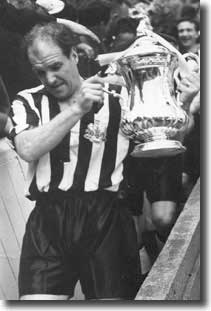 Despite their status as one of the finest club sides in Europe, when
Leeds United were drawn against Cardiff City in the FA Cup fifth round
draw in February 1972, they could have been excused just a sigh of apprehension;
the two clubs had already met a number of times in the competition, with
City earning a reputation as something of a bogey side for United.
Despite their status as one of the finest club sides in Europe, when
Leeds United were drawn against Cardiff City in the FA Cup fifth round
draw in February 1972, they could have been excused just a sigh of apprehension;
the two clubs had already met a number of times in the competition, with
City earning a reputation as something of a bogey side for United.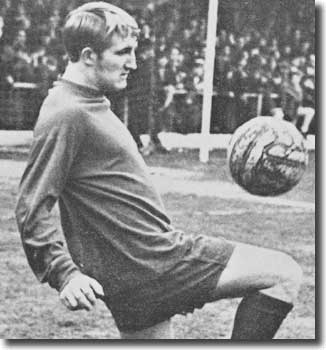 past
his best when he signed for Cardiff, often being referred to as
Fatty Foggon for his girth.
past
his best when he signed for Cardiff, often being referred to as
Fatty Foggon for his girth.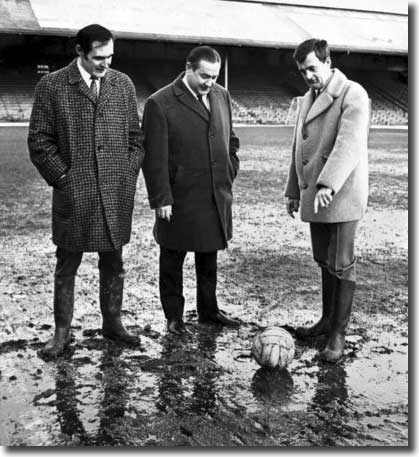 father, after his son had been released
by Aston Villa two years ago, wrote to the Cardiff manager who immediately
made him a member of the ground staff.
father, after his son had been released
by Aston Villa two years ago, wrote to the Cardiff manager who immediately
made him a member of the ground staff.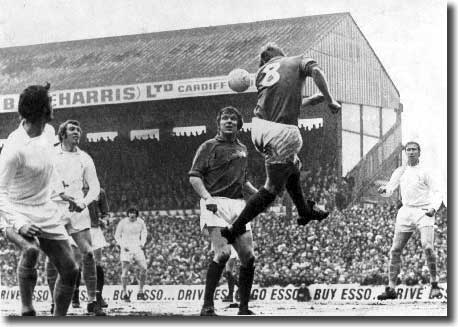 day before the Cup clash, the pitch had 'resembled a
river' according to the Yorkshire Evening Post; it 'had made a
remarkable recovery but it was still soft and looked likely to cut up
badly'. Hundreds of tons of sand were laid on the turf to ensure the game
could go ahead, and the central section of the pitch was boggy and holding.
A morning inspection was required before referee Keith Walker of Maidstone
was able to confirm that it was fit to play, much to the relief of a 50,000-strong
capacity crowd.
day before the Cup clash, the pitch had 'resembled a
river' according to the Yorkshire Evening Post; it 'had made a
remarkable recovery but it was still soft and looked likely to cut up
badly'. Hundreds of tons of sand were laid on the turf to ensure the game
could go ahead, and the central section of the pitch was boggy and holding.
A morning inspection was required before referee Keith Walker of Maidstone
was able to confirm that it was fit to play, much to the relief of a 50,000-strong
capacity crowd.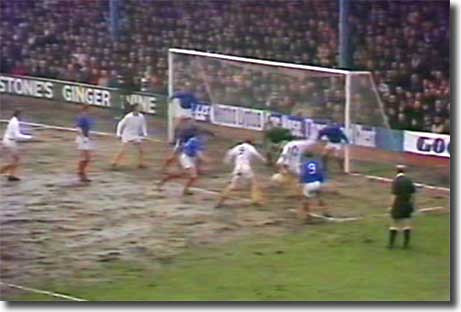 all the fuss over the pitch had been about.
It was certainly a bad surface, but the nimble Giles set United a great
example, and the fearsome pitch was conquered.'
all the fuss over the pitch had been about.
It was certainly a bad surface, but the nimble Giles set United a great
example, and the fearsome pitch was conquered.'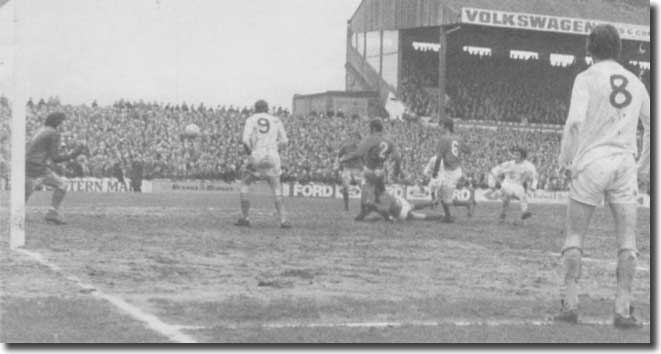 smoothly out of defence, Cooper, on
one of his many runs down the left flank, passed to Giles in the
middle. In turn he fed an unmarked Lorimer on the right. The Scot's
lofted cross dropped towards Allan Clarke, who had the time to
steady himself perfectly before heading down carefully to Giles
ten yards from goal. The Irish schemer took the pass, slipped
wide of a defender and coolly finished things off, flashing the
ball past keeper Irwin into the roof of the net. There were some
Cardiff claims for offside against Jones, but referee Walker waved
them dismissively away.
smoothly out of defence, Cooper, on
one of his many runs down the left flank, passed to Giles in the
middle. In turn he fed an unmarked Lorimer on the right. The Scot's
lofted cross dropped towards Allan Clarke, who had the time to
steady himself perfectly before heading down carefully to Giles
ten yards from goal. The Irish schemer took the pass, slipped
wide of a defender and coolly finished things off, flashing the
ball past keeper Irwin into the roof of the net. There were some
Cardiff claims for offside against Jones, but referee Walker waved
them dismissively away.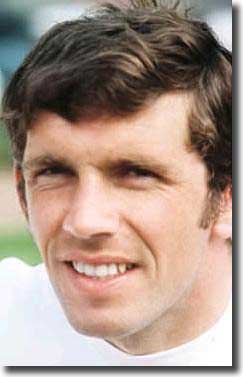 once or twice. Like his opposite number,
Giles, Gibson revelled in the mud and was still trying to inspire the
rest of the team when all hope had gone.'
once or twice. Like his opposite number,
Giles, Gibson revelled in the mud and was still trying to inspire the
rest of the team when all hope had gone.'